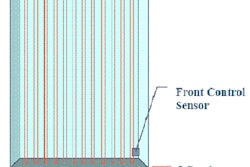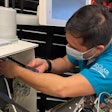A civil lawsuit has been filed in a federal court against a Boca Raton, FL, radiologist in what may be the first whistleblower case alleging violation of Medicare antikickback laws related to imaging center leases.
Dr. Fred Steinberg, sole owner of University MRI of Boca Raton and West Boca Open MRI, is accused of using lease deals with referring physicians as "cover for unlawful kickbacks," according to a recently unsealed lawsuit filed in the U.S. District Court for the Southern District of Florida in Miami.
The suit also alleges that Steinberg paid referring physicians for medical director or clinical investigator services that involved little or no actual work, and were thus kickbacks.
Further, Steinberg's centers are accused of filing claims for unnecessary medical services and "upcoding" claims to receive reimbursement beyond the services delivered, in violation of the federal False Claims Act.
A representative for Steinberg said the allegations were meritless. "The plaintiff is a disgruntled former employee," said spokeswoman Dana Clay.
In fact, the plaintiff in the lawsuit is Dr. David Clayman, a neuroradiologist who claims he was fired from University MRI in 2002 -- after nearly three years of employment -- when he confronted Steinberg about his coding practices.
As a "qui tam relator" or whistleblower, Clayman would be entitled to 25% of any monies recovered for the government based on the Medicare fraud he alleges. Another whistleblower who lodged coding allegations against a different Florida radiology group received $443,000 when her case was settled for $2.5 million last year.
DOJ inaction
But one notable difference in the earlier suit was that the U.S. Department of Justice had intervened -- essentially stepped in and took over the individual whistleblower's case. That hasn't happened in the latest case.
That means the charges made in the Steinberg case don't have the government's official backing -- a potential disappointment to some radiologists who have been hoping for government enforcement of antikickback laws to curb the pressure for making generous lease deals with referring physicians.
On the other hand, after the earlier case was filed, it apparently took the government nearly four years to intervene. The latest case was originally filed in December 2002. Under the federal False Claims Act, qui tam lawsuits are always initially filed under seal to give the government time to decide whether to intervene.
When contacted by AuntMinnie.com, representatives from the U.S. Attorney's Office in Miami declined to comment as to why the government hadn't intervened in the latest case or whether it might do so in the future.
The government's failure to intervene may indicate a weak plaintiff's case, in the view of one Washington, DC, lawyer who specializes in defending against False Claim Act accusations.
The government only intervenes in 20% of qui tam cases, yet more than 99% of the money recovered is from cases in which the government intervenes, according to attorney John Boese.
"I garner from that that most unintervened qui tam cases are essentially frivolous," Boese said. "They may not be frivolous; they're just not fraud."
But the Department of Justice has expressed concern about lease arrangements potentially crossing the line into kickbacks, another lawyer noted. Therefore, radiology groups still need to be very careful about the deals they make.
"It is newsworthy that the government has not intervened (in the Steinberg case), but it should not offer comfort that the government would not intervene in the appropriate case," said Thomas Greeson, a Falls Church, VA, attorney who specializes in healthcare law for radiology clients.
Lawsuit details
Clayman's lawsuit maintains that even when radiologists make good lease contracts, the failure to follow the conditions of those leases may be evidence of fraudulent intent.
In Steinberg's centers, for example, the suit claims that referring groups didn't provide a physician monitor when their exams were being performed, as specified in their lease arrangements. Referring groups also didn't limit their patients' scans to the time periods set out in their lease deals, the lawsuit alleges.
The lawsuit also charges that Steinberg was cutting below-market lease deals for some imaging modalities to let referring groups maximize their profit from billing for those while Steinberg gained all of a referring group's other imaging orders.
One example cited by the lawsuit was a deal involving a neurology group that purportedly leased ultrasound equipment for its office at a rate of $6,000 per year while hiring Steinberg to read those studies for just $6,000 per year.
The lawsuit also states that Steinberg contracted with referring physicians to serve as "medical directors" at his imaging centers or "clinical investigators" with his radiology foundation -- deals that "were papered to look legitimate but that in fact constituted unlawful kickback arrangements," according to the lawsuit.
The lawsuit named at least 11 referring physicians as having received up to $24,000 per year from Steinberg while doing little or no work in return.
Through these arrangements and others, the lawsuit alleges that Steinberg's "kickback scheme has had a profound impact on the Medicare referrals to other radiology practices in the area."
Coding claims
While not as novel as the kickback allegations, the lawsuit cites several examples of how Steinberg allegedly billed Medicare for unnecessary or upcoded services.
Questionable coding cited in the lawsuit includes the following:
- Billing for nonreimbursable virtual colonoscopies using reimbursable codes
- Claiming "chest CT with contrast" when no contrast was used
- Performing CT scans of the abdomen and pelvis with contrast (CPT codes 74160 and 72193) but reporting them as scans with and without contrast (74170 and 72194), which pay an additional $133
- Doing neck CT scans with contrast (70491) and billing them as with and without contrast (70492), worth an increase of $57
- Adding pelvic CT scans to all abdominal scan requests, even when the area of concern involved only the liver, pancreas, or other upper abdominal organ
- Billing for MRI of the right hip, left hip, and pelvis when only the pelvis scan was performed
- "Unbundling" MRI scans by performing and billing for exams of the pituitary or internal auditory canals as a brain MRI plus an MRI of the face and neck (70543), which pays another $1,029
- Routinely performing and billing for unneeded ophthalmic artery blood-flow exams after duplex ultrasound scans of the carotid and vertebral arteries
- Billing for "complete" rather than "limited" ultrasound studies of the abdomen and retroperitoneum that either weren't needed or weren't performed
Overall, the money at stake in the case could be substantial. According to the lawsuit, Steinberg's centers received more than $33 million in revenues from patient fees between 1999 and mid-2002.
But a resolution may not occur anytime soon. According to Steinberg's spokeswoman, the parties recently agreed to a six-month stay of all activity in the case. Attorneys for plaintiff Clayman didn't return AuntMinnie.com phone calls for comment.
By Tracie L. Thompson
AuntMinnie.com staff writer
July 19, 2005
Related Reading
As more referrers demand leases, rads hope for legal crackdown, May 5, 2005
Radiology group pays $2.5 million to settle alleged Medicare fraud, June 29, 2004
'Threatening' article to mammo expert throws malpractice case into disarray, December 16, 2003
Copyright © 2005 AuntMinnie.com



















